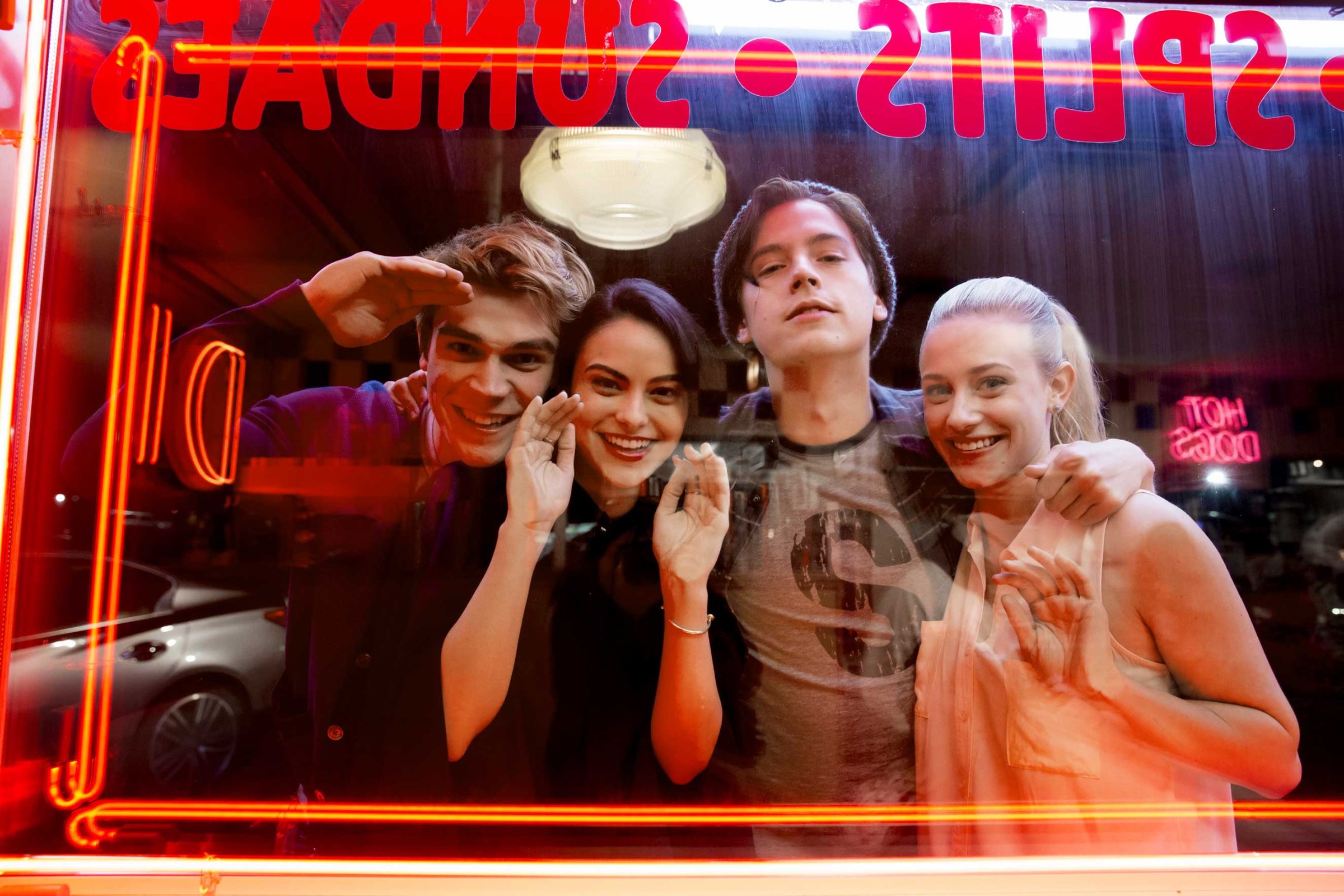
Comic books tend to have a vivid color palette. But the people tasked with adapting them for the screen are, ever more frequently, choosing darkness. Marvel’s Avengers are currently at war with one another; on Netflix, Luke Cage and Jessica Jones tell stories of disaffection and trauma; and the most recent Superman film depicted the Übermensch’s death.
What about Archie Andrews? The teen star of the Archie comics series, known over the past 75 years for its sunny lack of guile, comes to TV with the CW’s new soap Riverdale. While the familiar characters are there–including sweet-natured Betty and spoiled Veronica–this show wears new, gloomy affectations proudly. Riverdale is a signal of where entertainment has drifted: coming up with a dark story to tell is easy. Finding something to say is the hard part.
Riverdale‘s Archie (K.J. Apa) has a mournful mien–he’s not a character so much as a set of reference points about teen angst, down to the fact that he’s an aspiring rock singer of the indie variety. And forget choosing between Betty and Veronica (Lili Reinhart and Camila Mendes), the comics’ perpetual dilemma. This Archie is licking his wounds over a halted affair with his music teacher (Sarah Habel), a coupling she repeatedly warns could get her fired or arrested. As the series wears on, that may become inevitable: their final tryst took place near the scene of the mysterious murder of a local teen. And so key evidence becomes one more shared secret.
The story, which hinges on murder while branching out into vigilante justice and fortunes lost, alternates between playing out its plot and slyly commenting on it. (It’s worth noting that the Archie stories have grown darker and more libertine in recent years, but hardly to this degree.) Is the show’s voice-over, taken from a roman à clef written by the pained artist Jughead (Cole Sprouse), meant to be ludicrously overwrought or an earnest expression of pain? Why not both? We hear his poetics as the camera pans over the town, a sort of Rust Belt paradise lost, shot in the neo-noir style of Blue Velvet. The town’s institutions–the drive-in theater, a 24-hour diner–survive, just covered with a layer of grime.
The students of Riverdale, meanwhile, are no one’s throwback. They have a 2010s media savvy overlain with an odd courtliness, making stagy pronouncements as though they’re aware they’re on television. Betty describes Toni Morrison “as, you know, my literary hero,” while Veronica is a Truman Capote fan: “I’m Breakfast at Tiffany‘s, but this place is strictly In Cold Blood.” Its hard to believe either character is familiar with the novelists they cite, if only because they skip so quickly to the next cultural reference.
This airlessness is, itself, nothing new for TV. In the 2000s, both The O.C. and Gossip Girl depicted teenagers as mini-cosmopolitans. But those shows’ high schoolers were still governed by hormones, and they brought their moodiness to bear on story lines that were, by comparison to Riverdale, sweetly innocent. In the face of a murder of one of their classmates–whose waterlogged corpse we see, complete with a bullet wound to the head–the Riverdale teens default to shrugging irony. The departed’s bereaved sister Cheryl (Madelaine Petsch) devotes her energies to running cheerleading tryouts, at which Betty and Veronica attempt to make the squad with a fake-Sapphic act. “Check your sell-by date, ladies,” Cheryl announces. “Faux-lesbian kissing hasn’t been taboo since 1994.” The show depicts two lead characters in a clinch, then tells viewers they’re silly to care.
This is an odd cultural moment to try to adapt a property known for its Technicolor optimism–if old taboos are falling away, then this story needs something new against which to rebel. Riverdale, for all its virtuosic control of tone and its stars’ mastery of sangfroid, hasn’t found it. As a result, when the show does get earnest–as when Betty and Veronica boil a star athlete in a hot tub after tiring of his mockery of sexually active Riverdale girls–it’s hard to know how seriously to take it. Is there a message here, if occluded, about the phenomenon of “slut shaming”? Or does the show just want to show Betty and Veronica in swimsuits?
Little matter: the show pushes forward into a future defined more by amusements than by the possibilities of story. Take Josie and the Pussycats, Archie’s musician pals, who have moved from the fun-loving girl group they were on the page to a marketing machine. The group wears cat ears, Josie (Ashleigh Murray) tells us, because they’re “building a brand, creating a signature look.” When they perform at a pep rally, it’s flat and passionless. The joys and subversions of artistry have fallen away, and brand management–combining the appearance of sex and self-awareness, but none of the real thing–is a poor substitute. But if, like Riverdale, you hit all the notes, it can be hard to tell the difference.
RIVERDALE airs on the CW on Thursdays at 9 p.m. E.T.
More Must-Reads from TIME
- Cybersecurity Experts Are Sounding the Alarm on DOGE
- Meet the 2025 Women of the Year
- The Harsh Truth About Disability Inclusion
- Why Do More Young Adults Have Cancer?
- Colman Domingo Leads With Radical Love
- How to Get Better at Doing Things Alone
- Michelle Zauner Stares Down the Darkness
Contact us at letters@time.com